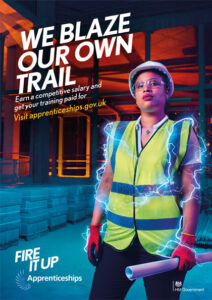 Nearly three years on from the introduction of the Apprenticeship Levy in April 2017, the Department for Education (DfE) have noted a 10% increase of apprenticeships between 2018 and 2019, as released in their figures in March 2019.
Nearly three years on from the introduction of the Apprenticeship Levy in April 2017, the Department for Education (DfE) have noted a 10% increase of apprenticeships between 2018 and 2019, as released in their figures in March 2019.
With reforms to the original levy rules coming into action last year, notably the 15% increase in the proportion of their funding contributions with smaller companies, employers across the UK are dynamically working to ensure their employees are gaining the right skills from the very start of their careers.
As a business, Waterman believes in the importance of bringing new talent into the industry and are actively working alongside schools, colleges and universities, the Technical Apprenticeship Consortium (TAC), Institution of Civil Engineers (ICE), Chartered Institute of Building Services Engineers (CIBSE), Construction Youth Trust, London Boroughs of Southwark, Bexley and Lewisham, Midland Metro Alliance, XLP and ACE (amongst others) to develop our apprenticeship offering.
With many students daunted by the prospect of investing a minimum of three years undertaking a course they have not had any previous education in, especially when tuition fees were hiked up to £9,000 in 2012, apprenticeships have proved an equal opponent to university by allowing an individual to achieve a higher-level qualification whilst gaining invaluable experience within the workplace.
A recent survey by ITV asked 800 parents their thoughts on the on-going apprenticeship versus university debate with 59% believing that an apprenticeship provides better job opportunities than going to university alone. 51% said they would encourage their child to apply for an apprenticeship over a full-time degree.
Amongst our young talents is Tahirah Tang-Campbell, a Structures Apprentice who joined Waterman in September 2017. In October 2019, she became one of the faces for M&C Saatchi’s ‘Fire It Up’ apprenticeships campaign for the DfE as part of a wider-reaching platform to inspire students to consider the variety of roles available to them outside of university. Following the campaign’s success, she has been able to promote the importance of apprenticeships on a global scale, most recently speaking to the Australian Government about the advantages for their students if they were to take more control of their futures. She explains; “An apprenticeship is so much more than just learning on the job, it’s a personal development opportunity. A lot of individuals who take on an apprenticeship are usually at the start of their careers and have minimal to no theoretical or practical experience, so there is a lot to learn in terms of interpersonal, communication and adaptability skills. Each new task has allowed me to grow as a person and I’ve seen a change in the way I present myself, professionally as well as outside of the office.”
However, apprenticeships do not only procure a positive future for an employee. An independent study by the UK Government found that 59% of 555 decision-makers in organisations in England thought apprenticeships were more valuable to them as it allows them the opportunity to grow their businesses from the bottom up.
In June, Waterman was awarded ‘Apprentice Employer of the Year’ at the Southwark Business Excellence Awards as a result of Nick Harrison, our Group Learning and Development Manager, taking the lead on a number of initiatives in order to develop and deliver an apprenticeship scheme that will lead to more successful careers in engineering and environmental science. When reflecting on the increasing number of apprentices that have joined our teams across the last three years, Nick commented; “2019 was a great year for Waterman as we continued to build on the company’s social value activity and our apprentices were pivotal to these successes. It is highly rewarding to see each candidate’s passion for learning and eagerness to get involved in cutting-edge work as they actively contribute to the business, making the most of the learning opportunities they have been given or proactively sought. Building relationships with internal colleagues and external partners has been vital in making the most of the Apprenticeship Levy since it was introduced in 2017 and I am looking forward to further embedding the scheme in 2020 and beyond.”



